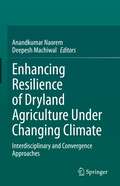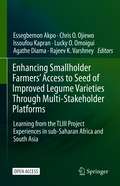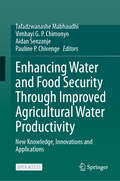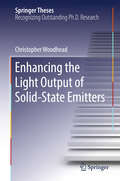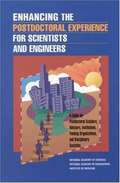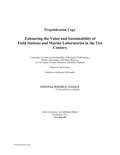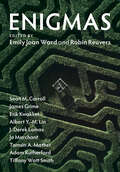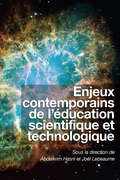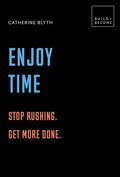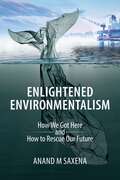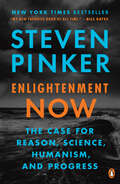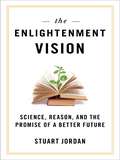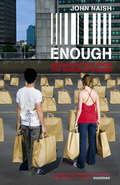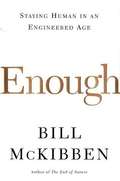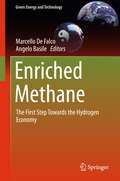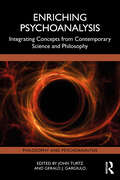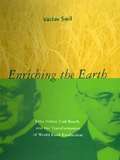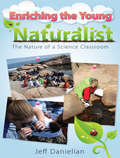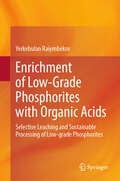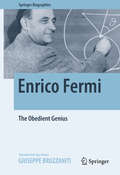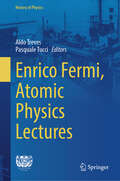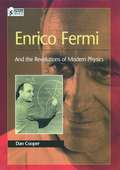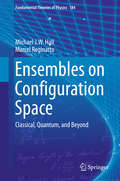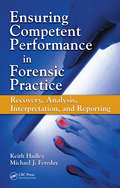- Table View
- List View
Enhancing Resilience of Dryland Agriculture Under Changing Climate: Interdisciplinary and Convergence Approaches
by Deepesh Machiwal Anandkumar NaoremThis contributed volume describes management practices based on interdisciplinary and convergence science approaches from different disciplines of agricultural science to enhance the resilience of dryland agriculture. The main focus of this book is to address the current issues and trends along with future prospects and challenges in adopting salient agricultural management practices in drylands globally under a climate-change scenario. Climate change and global warming have profound repercussions on increasing frequency, severity, and duration of droughts and/or floods, which may have implications for future productivity of dryland agriculture, e.g., more water shortages or abundances and high or low runoff rates, diminished crop yields, and reduced water productivity. In past few years, many technological advancements and management strategies have been evolved to tackle the climate-induced risks of dryland agriculture considering interdisciplinary and convergence approaches that integrate knowledge from multi-disciplines. This book is an attempt to bridge the gap in literature by unraveling controversies and characteristics of dryland ecosystems under the changing climate and dealing with detailed procedures of applying the advanced practices adapted to climate change for management of dryland agriculture. This edited book is of interest to ecologists, economists, environmentalists, geologists, horticulturalists, hydrologists, soil scientists, social scientists, natural resource conservationists and policy makers dealing with dryland agriculture. This book offers a broad understanding of dryland agriculture and assists the reader to identify both the current as well as the probable future state of dryland agriculture in a global context.
Enhancing Smallholder Farmers' Access to Seed of Improved Legume Varieties Through Multi-stakeholder Platforms: Learning from the TLIII project Experiences in sub-Saharan Africa and South Asia
by Rajeev K. Varshney Essegbemon Akpo Lucky O. Omoigui Chris O. Ojiewo Issoufou Kapran Agathe DiamaThis open access book shares the experiences of Tropical Legumes III (TLIII) project in facilitating access to seed of improved legume varieties to smallholder farmers through innovation platforms. It highlights practices and guiding principles implemented in eight developing countries of sub-Saharan Africa and South Asia. This book details key processes that respective teams employed to create an innovation space that delivers seed, other inputs, knowledge and financial services to agricultural communities and most importantly, the underserved farmers in remote areas of the drylands. It offers valuable insights into the pathway to establishing, promoting and operating innovation platforms to enhance the performance and competitiveness of legume crops’ value chains, and addresses critical issues that must be considered to make innovation platforms more sustainable and attractive to beneficiaries. The book offers a wealth of practical insights for development workers, technical staff, and project managers. This publication is all about TLIII community of practice. It will definitely inspire other development workers and scientists to share their own experiences for others to learn from.
Enhancing Water and Food Security Through Improved Agricultural Water Productivity: New Knowledge, Innovations and Applications
by Tafadzwanashe Mabhaudhi Vimbayi G. P. Chimonyo Aidan Senzanje Pauline P. ChivengeThis open-access edited book provides a synthesis of knowledge on Water Productivity (WP) and its role in addressing global challenges related to water and food insecurity, as well as climate change. It explores how increasing WP can contribute to achieving several Sustainable Development Goals (SDGs) in the global South, with a focus on SDG 2, 6, and 12. The volume connects WP with emerging approaches such as the water-energy-food nexus, sustainable food systems, and the circular economy. It features case studies, critical analyses, and meta-analyses that bridge the science-policy-practice interface. The book also delves into WP's relation to global priorities, policies, and the empowerment of vulnerable communities, highlighting the non-negotiable rights to water and food. Governance, policies, and institutions are discussed in the context of enhancing WP in farmer-led irrigation and scaling WP technologies. The book also covers emerging methods for determining WP, assessing linkages to nutrition, health, and well-being, and integrating climate change adaptation and mitigation strategies. This is a guide for regional and international experts, professionals, and scholars interested in agricultural water management in the global south. The book has the potential to inform multi-regional and sectoral policies, particularly in Africa, and contribute to sustainable development through better resource management.
Enhancing the Light Output of Solid-State Emitters (Springer Theses)
by Christopher WoodheadThe significance of the development of solid-state lighting was underscored by the award of a Nobel Prize in 2014. It is important to build upon this work and to produce practical and versatile sources of quantum light, because these are essential components for the advancement of quantum photonic devices. These devices, in turn, promise new technologies that have the potential to revolutionize society. This book explores various ways of coupling quantum light into, and out of, solid-state emitters. The research presented here has led to important discoveries that will help overcome major challenges in this field.
Enhancing the Postdoctoral Experience for Scientists and Engineers: A Guide for Postdoctoral Scholars, Advisers, Institutions, Funding Organizations, and Disciplinary Societies
by Committee on Science Public PolicyThe concept of postdoctoral training came to science and engineering about a century ago. Since the 1960s, the performance of research in the United States has increasingly relied on these recent PhDs who work on a full-time, but on a temporary basis, to gain additional research experience in preparation for a professional research career. Such experiences are increasingly seen as central to careers in research, but for many, the postdoctoral experience falls short of expectations. Some postdocs indicate that they have not received the recognition, standing or compensation that is commensurate with their experience and skills. Is this the case? If so, how can the postdoctoral experience be enhanced for the over 40,000 individuals who hold these positions at university, government, and industry laboratories?This new book offers its assessment of the postdoctoral experience and provides principles, action points, and recommendations for enhancing that experience.
Enhancing the Value and Sustainability of Field Stations and Marine Laboratories in the 21st Century
by Education Committee on Value Sustainability of Biological Field Stations Marine Laboratories Nature Reserves in the 21st Century Science Public OutreachFor over a century, field stations have been important entryways for scientists to study and make important discoveries about the natural world. They are centers of research, conservation, education, and public outreach, often embedded in natural environments that range from remote to densely populated urban locations. Because they lack traditional university departmental boundaries, researchers at field stations have the opportunity to converge their science disciplines in ways that can change careers and entire fields of inquiry. Field stations provide physical space for immersive research, hands-on learning, and new collaborations that are otherwise hard to achieve in the everyday bustle of research and teaching lives on campus. But the separation from university campuses that allows creativity to flourish also creates challenges. Sometimes, field stations are viewed as remote outposts and are overlooked because they tend to be away from population centers and their home institutions. This view is exacerbated by the lack of empirical evidence that can be used to demonstrate their value to science and society. "Enhancing the Value and Sustainability of Field Stations and Marine Laboratories in the 21st Century" summarizes field stations' value to science, education, and outreach and evaluates their contributions to research, innovation, and education. This report suggests strategies to meet future research, education, outreach, infrastructure, funding, and logistical needs of field stations. Today's technologies - such as streaming data, remote sensing, robot-driven monitoring, automated DNA sequencing, and nanoparticle environmental sensors - provide means for field stations to retain their special connection to nature and still interact with the rest of the world in ways that can fuel breakthroughs in the environmental, physical, natural, and social sciences. The intellectual and natural capital of today's field stations present a solid platform, but many need enhancements of infrastructure and dynamic leadership if they are to meet the challenges of the complex problems facing the world. This report focuses on the capability of field stations to address societal needs today and in the future.
Enigmas (Darwin College Lectures)
by Emily Joan Ward Robin ReuversArising from the 2020 Darwin College Lectures, this book presents eight essays from prominent public intellectuals on the theme of Enigmas. Each author examines this theme through the lens of their own particular area of expertise, together constituting an illuminating and diverse interdisciplinary volume. Enigmas features contributions by professor of physics Sean M. Carroll, author Jo Marchant, writer and broadcaster Adam Rutherford, professor of earth sciences Tamsin A. Mather, professor of the history of the book Erik Kwakkel, reader in cultural history Tiffany Watt Smith, mathematician and public speaker James Grime, assistant professor of positive AI J. Derek Lomas, and explorer Albert Y.- M. Lin. This volume will appeal to anyone fascinated by puzzles and mysteries, solved and unsolved.
Enjeux contemporains de l'éducation scientifique et technologique (Collection Questions en éducation)
by Hasni, Abdelkrim; Lebeaume, JoëlAu cours de la dernière décennie, l’enseignement scolaire au Québec et en France a été profondément renouvelé et reconfiguré par des actions publiques en matière d’éducation et par les missions affectées à l’enseignement obligatoire. Les auteurs de cet ouvrage considèrent cette problématique en éducation scientifique et technologique. Ils montrent à la fois la diversité et la complémentarité des reconfigurations contemporaines de l’éducation scientifique et technologique dans la scolarité, touchant des sujets tels que l’enseignement général, l’enseignement agricole, la formation des enseignants, la formation citoyenne et l’éducation à l’environnement et au développement durable. Par les thématiques abordées, ils questionnent autant les curriculums dans leurs relations aux pratiques d’enseignement en classe que les impacts sur les objets et les questions de recherche en didactique. Avec des articles rédigés par Pierre Degret, Marc Boutet, André Giordan, Jean-Louis Martinand, Ghislain Samson et Laurence Simonneaux.
Enjoy Time: Stop Rushing. Get More Done. (Build + Become)
by Catherine BlythGain a better understanding of the nature of time and learn how to manage your time and improve your life.We are living longer than ever and, thanks to technology, we are able to accomplish so much more. So why do we feel time poor? In twenty eye-opening lessons, Catherine Blyth combines cutting-edge science and psychology to show why time runs away from you, then provides the tools to get it back.Learn why the clock speeds up just when you wish it would go slow, how your tempo can be manipulated and why we all misuse and miscalculate time. But you can beat the time thieves. Reset your body clock, refurbish your routine, harness momentum and slow down. Not only will time be more enjoyable, but you really will get more done.
Enlightened Environmentalism: How We Got Here and How to Rescue Our Future
by Anand M SaxenaA continuous search for comforts, conveniences, and novel objects has brought humanity to a state where a continuation of this process endangers the welfare, perhaps even survival of humanity. The present lifestyle of profligate consumption, aided by deve
Enlightenment Now: The Case for Reason, Science, Humanism, and Progress
by Steven Pinker<P> If you think the world is coming to an end, think again. Steven Pinker presents the big picture of human progress: people are living longer, healthier, freer, and happier lives, and while our problems are formidable, the solutions lie in the Enlightenment ideal of using reason and science.Is the world really falling apart? Is the ideal of progress obsolete? <P> In this elegant assessment of the human condition in the third millennium, cognitive scientist and public intellectual Steven Pinker urges us to step back from the gory headlines and prophecies of doom, which play to our psychological biases. <P>Instead, follow the data: In seventy-five jaw-dropping graphs, Pinker shows that life, health, prosperity, safety, peace, knowledge, and happiness are on the rise, not just in the West, but worldwide. This progress is not the result of some cosmic force. It is a gift of the Enlightenment: the conviction that reason and science can enhance human flourishing.Far from being a naïve hope, the Enlightenment, we now know, has worked. But more than ever, it needs a vigorous defense. <P>The Enlightenment project swims against currents of human nature--tribalism, authoritarianism, demonization, magical thinking--which demagogues are all too willing to exploit. Many commentators, committed to political, religious, or romantic ideologies, fight a rearguard action against it. The result is a corrosive fatalism and a willingness to wreck the precious institutions of liberal democracy and global cooperation. With intellectual depth and literary flair, Enlightenment Now makes the case for reason, science, and humanism: the ideals we need to confront our problems and continue our progress. <P><b>A New York Times Bestseller</b>
Enlightenment Vision: Science, Reason, and the Promise of a Better Future
by Stuart JordanThis thought-provoking analysis evaluates the progress that global society has made since the Enlightenment. The author begins by pointing out features of present-day society that are the direct descendants of the Enlightenment's discoveries and advances: our technology, modern medicine, science-based worldview, democratic political institutions, and concepts of human rights are all an outgrowth of the pioneering efforts of Enlightenment reformers. But along with these benefits, the author notes that we are also the inheritors of some significant problems produced in the wake of these advances; overpopulation, nuclear proliferation, and global climate change are just some of the recent developments that seem to threaten the whole Enlightenment project. Other great concerns include the continuing economic disparity between prosperous and impoverished nations, the persistence of widespread ignorance, and destructive reactionary forces bent on provoking new conflicts. Despite these and other daunting challenges of the twenty-first century, the author concludes on a cautiously optimistic note, predicting that the Enlightenment vision of prosperity, security, justice, and good health for all will eventually be achieved.
Enough
by John NaishFor millions of years, humankind has used a brilliantly successful survival strategy. If we like something, we chase after more of it: more status, more food, more info, more stuff. Then we chase again. Its how we survived famine, disease and disaster to colonise the world. But now, thanks to technology, weve suddenly got more of everything than we can ever use, enjoy or afford. That doesnt stop us from striving though and its making us sick, tired, overweight, angry and in debt. It burns up our personal ecologies and the planets ecology too. We urgently need to develop a sense of enough. Our culture keeps telling us that we dont yet have all we need to be happy, but in fact we need to nurture a new skill the ability to bask in the bounties all around us. ENOUGH explores how our Neolithic brain-wiring spurs us to build a world of overabundance that keeps us hooked on more. John explains how, through adopting the art of enoughness, we can break from this wrecking cycle. With ten chapters on topics such as Enough food, Enough stuff, Enough hurry and Enough information, he explores how we created the problem and gives us practical ways to make our lives better.
Enough
by John NaishFor millions of years, humankind has used a brilliantly successful survival strategy. If we like something, we chase after more of it: more status, more food, more info, more stuff. Then we chase again. Its how we survived famine, disease and disaster to colonise the world. But now, thanks to technology, weve suddenly got more of everything than we can ever use, enjoy or afford. That doesnt stop us from striving though and its making us sick, tired, overweight, angry and in debt. It burns up our personal ecologies and the planets ecology too. We urgently need to develop a sense of enough. Our culture keeps telling us that we dont yet have all we need to be happy, but in fact we need to nurture a new skill the ability to bask in the bounties all around us. ENOUGH explores how our Neolithic brain-wiring spurs us to build a world of overabundance that keeps us hooked on more. John explains how, through adopting the art of enoughness, we can break from this wrecking cycle. With ten chapters on topics such as Enough food, Enough stuff, Enough hurry and Enough information, he explores how we created the problem and gives us practical ways to make our lives better.
Enough: Staying Human in an Engineered Age
by Bill MckibbenWe are on the verge of crossing the line from born to made, from created to built. Sometime in the next few years, a scientist will reprogram a human egg or sperm cell, spawning a genetic change that could be passed down into eternity. We are sleepwalking toward the future, argues Bill McKibben, and it's time to open our eyes. In "The End of Nature", nearly fifteen years ago, McKibben demonstrated that humanity had begun to irrevocably alter--and endanger--our environment on a global scale. Now he turns his eye to an array of technologies that could change our relationship not with the rest of nature but with ourselves. He explores the frontiers of genetic engineering, robotics, and nanotechnology--all of which we are approaching with astonishing speed--and shows that each threatens to take us past a point of no return. We now stand at a critical threshold, poised between the human past and a post-human future. Ultimately, McKibben offers a celebration of what it means to be human, and a warning that we risk the loss of all meaning if we step across the threshold. His wise and eloquent book argues that we cannot forever grow in reach and power--that we must at last learn how to say, 'Enough.'
Enriched Methane
by Angelo Basile Marcello FalcoThis book brings together recent research from across the world on enriched methane, and examines the production, distribution and use of this resource in internal combustion engines and gas turbines. It aims to provide readers with an extensive account of potential technological breakthroughs which have the capacity to revolutionize energy systems. Enriched methane, a gas mixture composed by methane and hydrogen (10-30%vol), constitutes the first realistic step towards the application of hydrogen as an energy vector. It provides strong benefits in terms of emissions reduction, that is -11% of CO2, eq emission with the combustion of a 30%vol H2 mixture, if hydrogen is produced from renewable energy sources. Enriched methane offers the following advantages: * it can be produced at competitive costs; * it can be distributed by means of the medium pressure natural gas grid; * it can be stored in traditional natural gas storage systems; This book is intended for academics in chemical engineering and energy production, distribution and storage. It is also intended for energy producers, engineering companies and R&D organizations.
Enriching Psychoanalysis: Integrating Concepts from Contemporary Science and Philosophy (Philosophy and Psychoanalysis)
by Gerald J. Gargiulo John TurtzThis compelling collection illuminates new models and metaphors taken from the contemporary sciences and philosophical thought to revitalize and recontextualize psychoanalysis for the 21st century. The exploration of quantum mechanics, chaos and complexity theory, epigenetics, and neuropsychoanalysis provides the reader with new layers of meaning and understanding that in turn lead to an enriching of psychoanalytic theory and a deepening of experience in the consulting office. The intersection of psychoanalysis, contemporary sciences, and philosophy leads the reader to new worlds that can transform the lens from which one views the psychoanalytic process. Written for psychoanalysts and psychotherapists, as well as scholars of psychoanalysis that are interested in the intersection of psychoanalysis, contemporary science, and philosophy, Enriching Psychoanalysis: Integrating Concepts from Contemporary Science and Philosophy expands the focus and meaning of current psychoanalytic theory and practice.
Enriching the Earth: Fritz Haber, Carl Bosch, and the Transformation of World Food Production
by Vaclav SmilThe industrial synthesis of ammonia from nitrogen and hydrogen has been of greater fundamental importance to the modern world than the invention of the airplane, nuclear energy, space flight, or television. The expansion of the world's population from 1. 6 billion people in 1900 to today's six billion would not have been possible without the synthesis of ammonia. In Enriching the Earth, Vaclav Smil begins with a discussion of nitrogen's unique status in the biosphere, its role in crop production, and traditional means of supplying the nutrient. He then looks at various attempts to expand natural nitrogen flows through mineral and synthetic fertilizers. The core of the book is a detailed narrative of the discovery of ammonia synthesis by Fritz Haber -- a discovery scientists had sought for over one hundred years -- and its commercialization by Carl Bosch and the chemical company BASF. Smil also examines the emergence of the large-scale nitrogen fertilizer industry and analyzes the extent of global dependence on the Haber-Bosch process and its biospheric consequences. Finally, it looks at the role of nitrogen in civilization and, in a sad coda, describes the lives of Fritz Haber and Carl Bosch after the discovery of ammonia synthesis.
Enriching the Young Naturalist: The Nature of a Science Classroom
by Jeff Danielianscience education
Enrichment of Low-Grade Phosphorites with Organic Acids: Selective Leaching and Sustainable Processing of Low-grade Phosphorites
by Yerkebulan RaiymbekovMonograph presents a detailed exploration of innovative technologies for processing and upgrading low-grade phosphorites using organic acids. The book offers a comprehensive analysis of the selective leaching process, optimizing parameters such as temperature, pH, and acid concentration to maximize efficiency. It also includes experimental data on the structural and chemical changes in phosphorite materials during treatment, supported by advanced characterization techniques. Practical case studies demonstrate the environmental benefits of these sustainable methods, making this work an invaluable resource for researchers, industry professionals, and graduate students seeking modern, eco-friendly solutions for phosphate enrichment.
Enrico Fermi
by Giuseppe BruzzanitiThis biography explores the life and career of the Italian physicist Enrico Fermi, which is also the story of thirty years that transformed physics and forever changed our understanding of matter and the universe: nuclear physics and elementary particle physics were born, nuclear fission was discovered, the Manhattan Project was developed, the atomic bombs were dropped, and the era of "big science" began. It would be impossible to capture the full essence of this revolutionary period without first understanding Fermi, without whom it would not have been possible. Enrico Fermi: The Obedient Genius attempts to shed light on all aspects of Fermi's life - his work, motivation, influences, achievements, and personal thoughts - beginning with the publication of his first paper in 1921 through his death in 1954. During this time, Fermi demonstrated that he was indeed following in the footsteps of Galileo, excelling in his work both theoretically and experimentally by deepening our understanding of the Pauli exclusion principle, winning the Nobel Prize for his discovery of the fundamental properties of slow neutrons, developing the theory of beta decay, building the first nuclear reactor, and playing a central role in the development of the atomic bomb. Interwoven with this fascinating story, the book details the major developments in physics and provides the necessary background material to fully appreciate the dramatic changes that were taking place. Also included are appendices that provide a timeline of Fermi's life, several primary source documents from the period, and an extensive bibliography. This book will enlighten anyone interested in Fermi's work or the scientific events that led to the physics revolution of the first half of the twentieth century.
Enrico Fermi, Atomic Physics Lectures (History of Physics)
by Aldo Treves Pasquale TucciIn autumn of 1949, Enrico Fermi returned to Italy after an eleven-year absence to deliver nine lectures, six in Rome and three in Milan. Apart from subsequent limited publication, this material has been little seen by the larger scientific community. This volume represents the first time that these nine lectures have been published in English. The nine lectures collected in this book represent a precious document of Fermi’s view on topics with which he had engaged in the previous decades. They were addressed to the young Italian physicists and to a more general audience only then beginning to recover from the physical and moral disruption of the war. Published in collaboration with the Italian Physical Society (SIF), the book includes a presentation of the president of SIF, an introduction written by the editors, and two substantial essays: one on Fermi’s life, and a second on Fermi’s skill in talking about Physics in a clear and sparkling manner. The volume appears as a contribution to the 70th anniversary of Fermi's death, and should appeal not only to students of physics, but to both those with an interest in the history of science in general and those who wish for a clearer picture of the life and mind of this pioneering physicist.
Enrico Fermi: And The Revolutions Of Modern Physics (Oxford Portraits In Science Ser.)
by Dan CooperIn 1938, at the age of 37, Enrico Fermi was awarded the Nobel Prize in Physics. That same year he emigrated from Italy to the United States and, in the course of his experiments, discovered nuclear fission--a process which forms the basis of nuclear power and atomic bombs. Soon the brilliant physicist was involved in the top secret race to produce the deadliest weapon on Earth. He created the first self-sustaining chain reaction, devised new methods for purifying plutonium, and eventually participated in the first atomic test. This compelling biography traces Fermi's education in Italy, his meteoric career in the scientific world, his escape from fascism to America, and the ingenious experiments he devised and conducted at the University of Rome, Columbia University, and the Los Alamos laboratory. The book also presents a mini-course in quantum and nuclear physics in an accessible, fast-paced narrative that invokes all the dizzying passion of Fermis brilliant discoveries. Oxford Portraits in Science is an on-going series of scientific biographies for young adults. Written by top scholars and writers, each biography examines the personality of its subject as well as the thought process leading to his or her discoveries. These illustrated biographies combine accessible technical information with compelling personal stories to portray the scientists whose work has shaped our understanding of the natural world.
Ensembles on Configuration Space
by Michael J. W. Hall Marcel ReginattoThis book describes a promising approach to problems in the foundations of quantum mechanics, including the measurement problem. The dynamics of ensembles on configuration space is shown here to be a valuable tool for unifying the formalisms of classical and quantum mechanics, for deriving and extending the latter in various ways, and for addressing the quantum measurement problem. A description of physical systems by means of ensembles on configuration space can be introduced at a very fundamental level: the basic building blocks are a configuration space, probabilities, and Hamiltonian equations of motion for the probabilities. The formalism can describe both classical and quantum systems, and their thermodynamics, with the main difference being the choice of ensemble Hamiltonian. Furthermore, there is a natural way of introducing ensemble Hamiltonians that describe the evolution of hybrid systems; i. e. , interacting systems that have distinct classical and quantum sectors, allowing for consistent descriptions of quantum systems interacting with classical measurement devices and quantum matter fields interacting gravitationally with a classical spacetime.
Ensuring Competent Performance in Forensic Practice: Recovery, Analysis, Interpretation, and Reporting
by Keith Hadley Michael J. FeredayThis is the first book of its kind to encourage a common understanding of competence and demonstrate the application of standards and practice in all aspects of forensic science including collection of evidence, interpretation of scientific analysis, and appropriate methods of testimony. The authors stress the standardization of proper training and testing procedures and give clear guidelines for effective training programs based on occupational standards. The book examines the importance of workplace assessments of competence and emphasizes the role of those involved in the assessment process. The authors include several case studies demonstrating competence in practice and the methods to ensure consistent high standards in the future.
